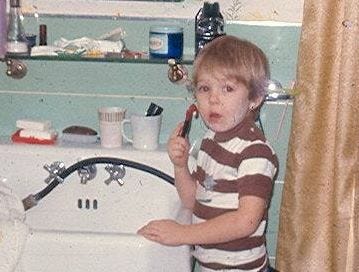A friend of mine recently posted a sort of “remember when we were kids in the 80’s?” kind of nostalgic video on social media the other day.
I was smiling seeing the rotary phones in use, and mailing a check for a mail order item. Those kids of things.
Then it hit me like a ton of bricks…
There was a time, not so long ago, when we had to wait for things…
You waited for a letter in the mail, with handwriting you recognized before even reading the return address.
You waited for your turn on the shared rotary landline phone, carefully dialing each number and praying the line wasn’t busy, or you didn’t screw up a number dialing out, because you’d have to hang up and start all over again.
If you wanted to know something, you had to go to the library, flip through a card catalog, and physically search for the answer. Or if you were lucky, look it up in an encyclopedia set you had at home.
It’s not that life was better then, but it was slower. And in that slowness, there was something we rarely talk about anymore: anticipation.
In the 1970s and 1980s, we didn’t just look forward to things, we lived in that space of waiting.
There was an unspoken glee in circling the date of a concert months in advance. There was the giddiness of knowing a friend would be calling at a certain time. We waited for photos to be developed, birthdays to bring the next cassette tape or album, or the next season of our favorite show to finally return. And when we did see a TV show, we had to catch it there and then… Otherwise it was gone. If you didn’t get to watch Rudolf the Red Nosed Reindeer on Sunday, December 12th at 8:00pm, you waited a year to see it again.
It’s easy to think of this as just nostalgia. But the truth is, anticipation is more than a passing memory, it’s a super powerful piece of mental wellness.
Modern psychology tells us what we used to experience as kids is actually beneficial: anticipation is good for us.
Anticipation activates the brain's reward system before the event even happens.
When we look forward to something, we engage in what's called "positive future thinking." It gives our days structure and purpose, and it triggers dopamine, the feel-good hormone.
Reflect on this for a moment: Imagining the good can feel almost as good as experiencing it.
In contrast, when everything is instant, we skip right past that mental and emotional build-up. We get the gratification, but not the journey. And over time, that can leave us feeling numb, unfulfilled, or constantly chasing the next attention fix.
Need directions? Your phone tells you in 3 seconds. Curious about a random fact? Just Google it. Want to see someone’s vacation photos or what they had for dinner? Scroll.
It’s all right there, on demand. Instantly.
And yet, rates of anxiety and depression have risen dramatically. We’re more connected, yet feel more alone. We’re productive (or give ourselves that illusion), but often joyless.
What if part of that is because we’ve eliminated one of life’s most simple and powerful pleasures: looking forward to something.
This isn’t a call to go back to rotary phones and Fotomats. But maybe it is a call to slow down on purpose.
Maybe we start planning things further out, and let ourselves get excited over time.
Maybe we don’t reply to every message instantly, or we send a letter just because.
Maybe we read a book we’ve been saving.
Maybe we don’t binge the whole season of a show in a weekend.
Let’s teach our kids what it means to wait for something and relish the waiting. Let’s remind ourselves that anticipation isn’t wasted time, it’s sacred time.
It’s the part of the journey where hope lives.
In a world where everything is fast, anticipation is a quiet kind of magic. It asks nothing from us but patience and in return, it gives us joy twice: once in the waiting, and again in the arrival.
Let’s not lose that.
*****
You're receiving free posts from my Your Pathway to Purpose Substack. I’m so grateful to have you with me. I trust that we have the kind of relationship where I can speak directly, knowing I will be heard with an open heart and mind, and you can expect the same from me.
If you appreciate what we’re creating here and would like to support me and my work, please consider a paid subscription.
I know that paying is not within reach for everyone. It’s important to me to make my work accessible for those who don’t have extra funds. This means you can still get great content, even if you don’t have a paid subscription. An annual subscription is less than $1/week... I would hope a small price to pay for an inspiring or informative message.
Thanks again for being on this journey with me! Much love!




